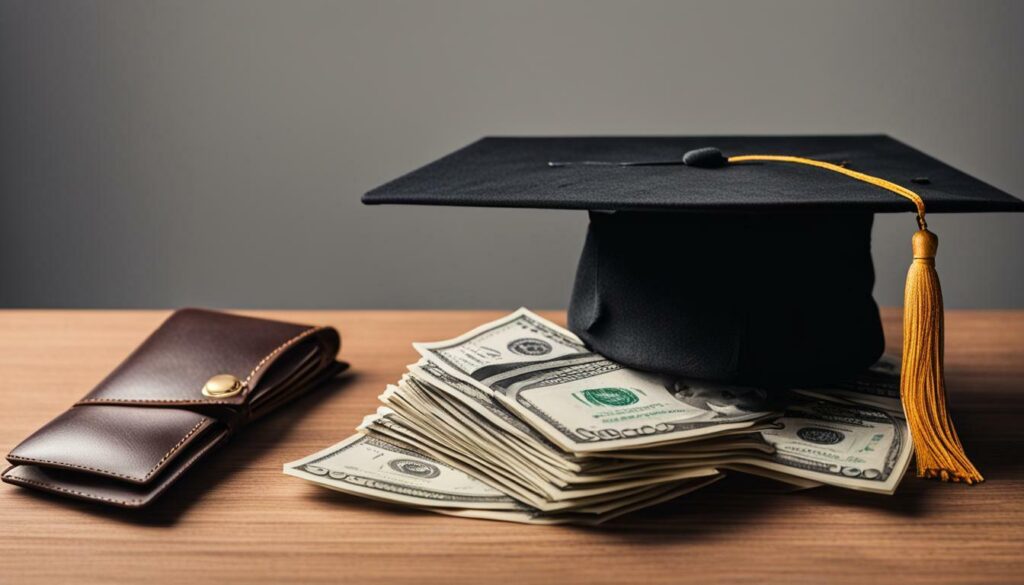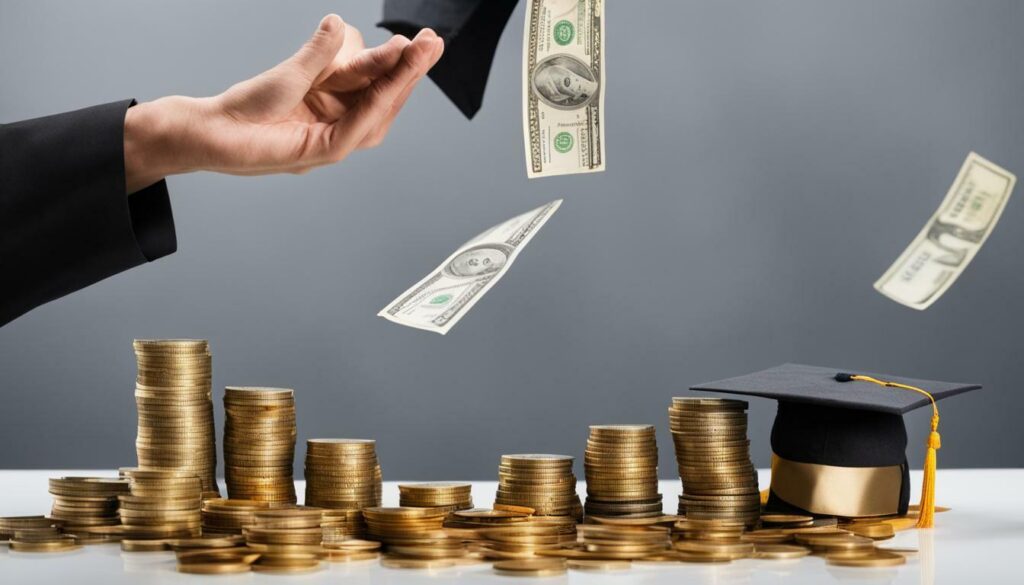Understanding How Student Loans Affect Credit Repair

If you have student loans, it’s crucial to understand how they can affect your credit repair journey and overall financial health. Student loans, like any other loans, have an impact on your credit. Timely payments can positively influence your credit score, while late or missed payments can have negative consequences. It’s important to note that federal student loans may not be reported as late until after 90 days, whereas private student loans could be reported as late after just 30 days. Defaulting on your student loans can have severe and long-lasting effects on your credit. However, there are strategies you can employ to manage your student loans effectively and improve your credit. Communication with your lender and exploring options such as payment plans, deferment, or forbearance can help. Additionally, student loans can have a positive impact on your credit by establishing a mix of credit types. If your student loans are co-signed by your parents, it’s important to understand how they can impact both your credit and your parents’ credit scores. If you find yourself in default on your student loans, there are credit repair strategies that can help you get back on track. By following these strategies consistently, you can work towards repairing your credit over time and achieving financial wellness.
- Timely payments on student loans can positively impact your credit score.
- Late or missed payments on student loans can harm your credit.
- Defaulting on student loans can have severe and long-lasting effects on your credit.
- Effective communication with your lender and exploring options like payment plans, deferment, or forbearance can help manage your student loans.
- Student loans can contribute to a healthy credit mix, although it is a smaller factor in credit scoring.
The Relationship Between Student Loans and Credit Scores
Your credit score can be significantly impacted by how you manage your student loans, with timely payments having a positive effect and late or missed payments potentially harming your credit score. It is crucial to understand the relationship between student loans and credit scores to ensure you maintain a healthy financial profile.
When it comes to student loans, paying them on time is key. Timely payments show lenders that you are responsible with your debts and can positively impact your credit score over time. On the other hand, late or missed payments can have the opposite effect. It is essential to prioritize your student loan payments to avoid any negative consequences on your credit.
It is important to note that the reporting timelines for federal and private student loans differ. Federal student loans generally do not get reported as late until at least 90 days of non-payment, while private student loans can be reported as late after just 30 days. This means that missing a single payment on a private student loan can have an immediate impact on your credit score.

The Relationship Between Student Loans and Credit Scores
| Payment Type | Impact on Credit Score |
|---|---|
| Timely Payments | Positive |
| Late or Missed Payments | Negative |
“Paying your student loans on time can significantly improve your credit score, while late or missed payments can have a detrimental effect.”
🚨 TUIC Errors + Low Credit Score?
CreditScoreIQ helps you build credit faster by reporting utility bills to all 3 bureaus—while you dispute errors.
Start Building Credit Today →
In addition to payment history, student loans can also impact your credit by contributing to a mix of credit types. This means that having a student loan alongside other types of credit, such as credit cards or a mortgage, can be beneficial for your credit score. However, it is worth noting that the impact of credit mix is a smaller factor compared to payment history and overall credit utilization.
Furthermore, if you took out student loans co-signed by your parents, it is important to understand that their credit can also be impacted by your loans. Any missed payments or defaults on these loans can affect both your credit score and your parents’. Responsible co-signing is crucial to ensure the financial health of both parties involved.
In summary, managing your student loans responsibly is vital for maintaining a good credit score. Make timely payments, communicate with your lender if you encounter difficulties, and explore options like deferment or forbearance if needed. By following these best practices consistently, you can improve your credit over time and reap the benefits of a healthy financial profile.
Understanding the Consequences of Defaulting on Student Loans
Defaulting on your student loans can have serious repercussions, damaging your credit for years to come.
When you default on your student loans, it means you have failed to make payments as agreed upon in your loan agreement. This can have severe consequences on your credit history and overall financial health. The damage caused by defaulting on student loans can make it difficult for you to secure future loans, such as a mortgage or car loan, and may even impact your ability to rent an apartment or secure employment.
Defaulting on federal student loans can result in wage garnishment, wherein the government can take a portion of your paycheck to repay the debt. Your tax refunds may also be seized to repay the defaulted loan. In addition, the federal government has the authority to take legal action against you, further damaging your credit and adding to your financial stress.
| Consequences of Defaulting on Student Loans | Impact on Credit |
|---|---|
| Wage garnishment | Significant negative impact |
| Tax refund seizure | Significant negative impact |
| Legal action | Significant negative impact |
| Difficulty securing future loans | Significant negative impact |
| Impact on employment and housing | Significant negative impact |
It is essential to take action if you find yourself unable to make your student loan payments. Communicate with your lender as soon as possible and explore options such as income-driven repayment plans, deferment, or forbearance. These alternatives can help you avoid default and minimize the negative impact on your credit. Remember, it is never too late to take steps towards repairing your credit and improving your financial situation.

When it comes to credit repair, effectively managing your student loans is key, and it starts with open communication with your lender and exploring available payment options. By taking proactive steps, you can improve your financial health and work towards repairing your credit.
One option to consider is setting up a payment plan with your lender. This can help you establish a structured repayment schedule that fits your budget. By making consistent, on-time payments, you can demonstrate responsible financial behavior and build positive credit history.

If you’re facing financial difficulties and are unable to make your student loan payments, it’s important to reach out to your lender as soon as possible. They may have options available such as deferment or forbearance, which can temporarily suspend or lower your payments based on your financial circumstances.
Additionally, it’s crucial to avoid defaulting on your student loans. Defaulting can have severe consequences on your credit and financial wellbeing. By proactively managing your student loans and exploring payment options, you can take control of your credit repair journey and work towards achieving a healthier financial future.
The Positive Impact of Student Loans on Credit
While student loans can impact your credit, they also have the potential to positively contribute by establishing a mix of credit types. This is an important factor in credit scoring as it demonstrates your ability to manage different types of debts responsibly. By successfully managing your student loan payments, you can show lenders that you are capable of handling different financial obligations, which can boost your creditworthiness.
“Having a diverse credit mix is important for building a good credit score,” says financial expert John Smith. “Lenders want to see that you can handle different types of debts, such as credit cards, mortgages, and student loans. This demonstrates your ability to manage various financial responsibilities and reflects positively on your credit report.”
Not only does having a mix of credit types enhance your credit profile, but it also offers you the opportunity to establish a positive payment history. Making your student loan payments on time and in full can significantly impact your credit score in a favorable way. Timely payments demonstrate your reliability as a borrower and show that you are responsible with your financial obligations.
| Key Takeaways: |
|---|
| Student loans can positively impact credit by establishing a mix of credit types. |
| Having a diverse credit mix is important for credit scoring and reflects positively on your credit report. |
| Paying your student loans on time and in full demonstrates your reliability and responsibility as a borrower. |
It’s worth noting that while student loans play a role in credit scoring, their impact is relatively smaller compared to other factors such as payment history and credit utilization. However, responsibly managing your student loans can still contribute to an overall healthy credit profile, opening doors to future financial opportunities.
As you navigate your student loan repayment journey, remember to stay on top of your payments, communicate with your lender if you encounter difficulties, and explore alternative options if needed. By taking proactive steps to manage your student loans, you can establish a positive credit mix and set yourself up for long-term financial success.

If your parents have co-signed your student loans, it’s essential to understand that these loans can impact both your credit score and your parent’s credit score. When your parents co-sign your loan, they are equally responsible for making payments. This means that any late or missed payments will show up on both your credit reports, affecting your individual creditworthiness.
Co-signing a student loan can have long-term consequences for both parties involved. If you consistently make on-time payments, it can help build a positive credit history for both you and your parents. However, if payments are missed or defaulted on, it can have a detrimental impact on your credit score. This can make it more difficult for you to secure future loans or credit, and it can also affect your ability to rent an apartment or get approved for a mortgage.
| Impact of Co-Signed Student Loans: | Student’s Credit Score | Parent’s Credit Score |
|---|---|---|
| On-time payments | Positive impact | Positive impact |
| Late or missed payments | Negative impact | Negative impact |
| Default on loan | Severe negative impact | Severe negative impact |
It’s important to have open communication with your parents about the responsibility of co-signed student loans and the potential impact on both parties’ credit scores. This will ensure that everyone is aware of the consequences and can work together to make timely payments. Additionally, if you’re struggling to make payments, it’s crucial to explore options like deferment, forbearance, or alternative repayment plans to avoid defaulting on the loan.
By being proactive and responsible in managing co-signed student loans, you can protect your own credit score and maintain a healthy financial future for both you and your parents.

If your credit has been negatively impacted by your student loans, there are several strategies you can employ to repair and improve your credit over time. Understanding how to effectively manage your student loans is crucial for your financial health.
First and foremost, communication with your lender is key. If you’re struggling to make your student loan payments, reach out to your lender as soon as possible. They may be able to offer alternative payment plans, deferment, or forbearance options that can provide temporary relief. By proactively addressing your situation, you can avoid defaulting on your loans, which can have severe consequences on your credit.
“Defaulting on student loans can have a long-lasting impact on your credit and financial wellbeing. It’s important to explore options like payment plans, deferment, or forbearance if you’re unable to make your student loan payments.”
| Strategies for Credit Repair: |
|---|
| 🔹 Get out of default: If you’re currently in default, there are options available to help you get back on track. You can rehabilitate your loans by making a series of on-time, voluntary payments. Once your loans are rehabilitated, the default status will be removed from your credit report. |
| 🔹 Pay off other debts: In addition to your student loans, it’s important to address any other outstanding debts that may be negatively impacting your credit. Prioritize paying off high-interest credit card balances or other loans to reduce your overall debt burden. |
| 🔹 Make on-time bill payments: Consistently making on-time payments for all of your financial obligations is crucial for improving your credit. Set up automatic payments or reminders to ensure you don’t miss any due dates. |
| 🔹 Consider a secured credit card: If your credit history has been significantly damaged, a secured credit card can be a useful tool for rebuilding credit. With a secured card, you’ll need to provide a security deposit, which serves as collateral for the credit limit. |
| 🔹 Apply for a credit-building loan: A credit-building loan, also known as a secured installment loan, can help establish a positive payment history. These loans require you to deposit a certain amount of money into an account, which you then repay in regular installments. Once the loan is paid off, you’ll receive the deposited funds. |
By implementing these credit repair strategies consistently, you can gradually improve your credit over time. Repairing credit takes patience and persistence, but by taking proactive steps towards managing your student loans and other debts, you can achieve a healthier financial future.

Understanding the relationship between student loans and credit repair is vital, and by implementing effective strategies, you can regain control of your credit and improve your overall financial health.
Student loans, like any other loans, have an impact on your credit. Making timely payments on your student loans can have a positive effect on your credit score. However, late or missed payments can harm your credit. It’s important to note that federal student loans may not be reported as late until at least 90 days, while private student loans can be reported after just 30 days.
Defaulting on student loans can have severe consequences on your credit. The damage caused by a default can last for many years, making it even more crucial to stay on top of your payments. If you find yourself unable to make your student loan payments, it’s essential to communicate with your lender and explore options such as payment plans, deferment, or forbearance.
Student loans can also have a positive impact on your credit. They are considered as part of your credit mix, which is a smaller factor in credit scoring. This means that having student loans alongside other types of credit, such as credit cards or auto loans, can contribute to a healthy credit profile.
If you have co-signed a student loan with your parents, it’s important to understand that this can have an impact on both your credit score and your parent’s credit score. Responsible co-signing and timely payments are key to maintaining the creditworthiness of both parties.
If you find yourself in a situation where your student loans have damaged your credit, there are credit repair strategies you can implement. Getting out of default, paying off other debts, making all bill payments on time, considering a secured credit card, and applying for a credit-building loan are all effective methods for repairing your credit over time.
By following these best practices consistently, you can take steps towards restoring your credit and improving your overall financial health. Understanding the impact of student loans on credit repair is the first step to regaining control and achieving your financial goals.
FAQ
1. How do student loans affect credit repair?
Student loans, like any other loans, impact credit in a similar way. Timely payments can positively affect your credit score, while late or missed payments can harm your credit.
2. When are federal student loans reported as late?
Federal student loans may not be reported as late until at least 90 days after the due date.
3. When are private student loans reported as late?
Private student loans can be reported as late after just 30 days of missed payment.
4. What are the consequences of defaulting on student loans?
Defaulting on student loans can have severe consequences on your credit. The damage can last for many years.
5. How can I manage my student loans for credit repair?
It is essential to communicate with your lender and explore options like payment plans, deferment, or forbearance. These strategies can help you manage your student loans and improve your credit.
6. Can student loans have a positive impact on credit?
Student loans can have a positive impact on credit by establishing a mix of credit types. This is a smaller factor in credit scoring.
7. How do parental co-signed student loans impact credit scores?
Student loans co-signed by parents can impact both the parent’s and the student’s credit scores. It is crucial to be responsible when co-signing loans.
8. What are some credit repair strategies for student loan borrowers?
To repair credit, consider getting out of default, paying off other debts, making all bill payments on time, considering a secured credit card, and applying for a credit-building loan.
Ready to Improve Your Credit?
Disputing TUIC errors is step one. Step two? Boost your score by reporting utility payments with CreditScoreIQ.
Get Started Now (Only $1 Trial) →3-bureau reporting • $1M identity insurance • Dark web monitoring



